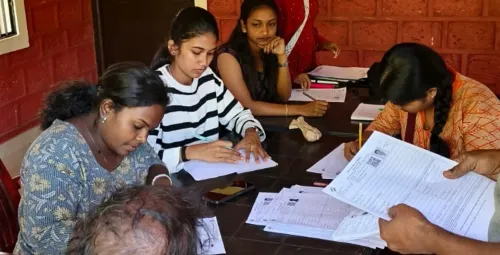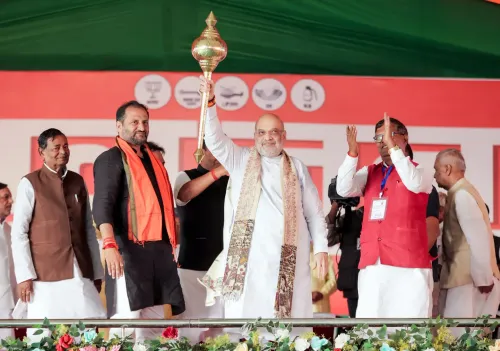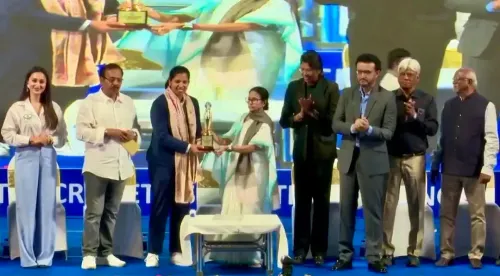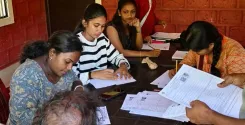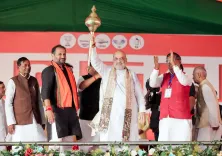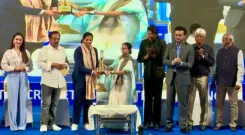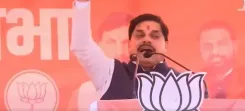MUDA Fraud: Limited Lokayukta Inquiry and Siddaramaiah’s Uncontested Denials Raise Concerns
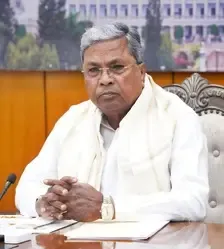
Synopsis
Key Takeaways
- The Lokayukta's investigation into the MUDA scam raises integrity questions.
- Chief Minister Siddaramaiah faced limited questioning, leading to skepticism.
- Key findings from the Enforcement Directorate were reportedly ignored.
- Siddaramaiah consistently denied any wrongdoing or knowledge.
- The investigation continues to raise more questions than answers.
New Delhi, Feb 24 (NationPress) The Lokayukta's investigation into the Mysore Urban Development Authority (MUDA) scam, which implicates Karnataka Chief Minister Siddaramaiah, his wife, and others, has led to significant concerns regarding the inquiry's integrity.
The Lokayukta's report, obtained by IANS, reveals that Siddaramaiah was subjected to just 30 questions before the investigation was swiftly concluded with the submission of a 'B report'.
This rapid closure has prompted skepticism. Even more troubling is that the Lokayukta seemingly ignored critical findings from the Enforcement Directorate (ED). The ED had previously highlighted the involvement of significant individuals, yet these revelations were not included in the Lokayukta's examination.
The narrow scope of questioning and the hasty termination of the case now cast doubt on the thoroughness and transparency of the Lokayukta's investigation.
On November 6, 2024, Siddaramaiah was questioned by authorities regarding the MUDA scam investigation. The initial questions, according to the report, revolved around basic personal details. Siddaramaiah, identified as the primary accused, acknowledged his name and his role as the current Chief Minister of Karnataka.
When asked about the allegations against him, Siddaramaiah stated he was aware of the charges and the individuals involved. His wife, B.M. Parvathi, was named as the second accused, along with his relative Mallikarjunaswamy and another person, Devaraju, who also faced charges. Siddaramaiah confirmed his knowledge of the case but denied any personal wrongdoing, as per the report.
The investigation then shifted to his family background. Siddaramaiah discussed his wife, his deceased son Rakesh, and his younger son Yathindra, who is a doctor. He also shared details about his wife's family, including her brother Mallikarjunaswamy, a central figure in the investigation. Siddaramaiah confirmed that Mallikarjunaswamy had been his brother-in-law since 1977, but asserted that there had been no financial transactions between them, according to the report.
As the inquiry progressed, attention turned to the land involved. In 2013, Mallikarjunaswamy bought 3 acres and 16 guntas of land in Kesare village, but Siddaramaiah claimed he was unaware of this deal until mid-2013 when his wife informed him and their son about the purchase. He denied providing any financial support to his brother-in-law or being involved in the land ownership transfer, as stated in the report.
Siddaramaiah was also questioned about his role in any land denotification, especially concerning land previously owned by Devaraju. He denied any knowledge of Devaraju and stated he had not helped in the land's denotification, although Devaraju had applied for land release in 1998.
The questioning then turned to the land donation to Siddaramaiah's wife. Mallikarjunaswamy donated the land to her in 2013, but Siddaramaiah maintained he was unaware of the donation until his wife informed him. He explained that during his tenure as Chief Minister in 2014, he had no knowledge of MUDA developing the land into roads, parks, and plots, asserting that he did not feel it was appropriate to intervene in such matters.
The investigators continued by questioning Siddaramaiah's connection to the land compensation granted to his wife by MUDA. Siddaramaiah confirmed he was unaware of his wife's application for compensation or the decisions made by the authority, including the provision of alternative land in a 60:40 ratio. He asserted he had no involvement in these processes and had not recommended any officials for the compensation.
When asked about the 14 plots of land awarded to his wife in 2020 as part of the compensation, Siddaramaiah again denied any prior knowledge. He stated he learned about the registration of the plots only after his wife informed him, asserting he had no influence over the approval or allocation process. He emphasized that he did not hold any position of authority that would have allowed him to interfere with MUDA's decisions at that time.
Siddaramaiah was then asked whether he had reported these 14 plots in his election affidavits. He admitted he did not remember mentioning them in his 2018 or 2023 election submissions and added that he had no recollection of including them in any documents filed with the Election Commission. The report also indicates Siddaramaiah informed Lokayukta officers that in mid-2013, his wife told him about the land donation, and he had mentioned it in a 2014 affidavit to the Karnataka Lokayukta.
As the questioning progressed, the focus shifted to amendments made in 2015 to the Karnataka Urban Development Rules, which impacted compensation ratios for landowners. Siddaramaiah claimed he was unaware of these amendments and denied recommending or influencing any changes to the rules.
The final round of questioning addressed the use of government property. Siddaramaiah was asked about the government guest house allegedly used for the registration of the 14 plots. He confirmed he had no knowledge of this and denied recommending its use for the transaction.
In the final segment of the interrogation, Siddaramaiah was asked if he had advised his wife to return the plots to MUDA. He stated that his wife had voluntarily chosen to return the plots, citing concerns about his reputation amid the controversy. Siddaramaiah also discussed the matter of using a whitener in the application submitted to MUDA, expressing ignorance of this detail.
Ultimately, when asked for additional information regarding his financial assets, Siddaramaiah provided his PAN card number but could not recall specific details about his bank accounts at that time. He concluded by stating he had no further information to add to the case.
The interrogation revealed a pattern of denials from the Chief Minister, who consistently claimed ignorance of various actions taken by his wife and relatives concerning the land deal. His responses, however, left unanswered questions regarding his involvement and the breadth of his knowledge, especially given his high-ranking position in the state government during the relevant period.
According to analysts, as the investigation persists, Siddaramaiah’s testimony remains a crucial component of the MUDA scam case, generating more inquiries than clarifications about the actions of both him and his family members in the dealings.


